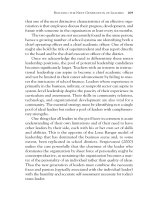How to study enghlish 4 potx
Bạn đang xem bản rút gọn của tài liệu. Xem và tải ngay bản đầy đủ của tài liệu tại đây (61.5 KB, 6 trang )
1
CHAPTER
1
GETTING STARTED
What do you do first?
In order to get the most
out of what you’re
studying, you need to be
in the mood. It helps if
you’re relaxed and
comfortable. It also helps if
you’re studying where,
when, and how you
like to work.
A
successful study session involves
preparation. You have to get yourself ready so that you can
get off to a good start. This means you’ve got to have all the
things you need for the task and you need a good place to do it in. And
maybe most important of all, you need to be mentally ready to begin.
This lesson will help you find out how to get ready for productive study.
HOW TO STUDY
2
GETTING IN THE MOOD
You probably know what it’s like to have to do something you don’t feel
like doing. Whether it’s studying, washing the dinner dishes, or training
a new person on the job, it’s easy to put off doing an unpleasant task.
PROCRASTINATION
You can come up with plenty of excuses for not doing something:
• “I can’t do the dishes now because I have to pay the bills.”
• “I can’t train Tony this morning because I’m expecting an
important call.”
• “I can’t study now because I have to get a haircut.”
At some time or another everyone procrastinates. The first step in con-
quering this problem is to recognize the actual reasons for procrastinating:
• You’re not sure you can do it.
• You’re afraid it will involve too much time and effort.
• You’re uneasy in new situations.
• You don’t want to be disturbed.
• It’s hard for you to get started.
Knowing why you’re procrastinating will help you overcome the
tendency to put things off, and you’ll find it easier to get moving.
Trick and Treat to Beat Procrastination
We all like be to rewarded for a job well done. And if we know there’s
going to be a reward at the end, we’ll be more motivated at the start. You
can apply this to studying: Trick yourself into working now by promising
yourself a treat later.
Before you read any further, think of a reward you can give yourself
after you complete this lesson or before you begin the next one. Here are
some suggestions for rewards to give yourself:
Try It!
Dealing with Trouble
Josie is reluctant to sign up for a management course she needs
to take to be considered for promotion. “I have so much trouble
studying,” she says, “I can’t find the time. There are so many
other things I have to do. And there’s no place for me to study! I
can’t study at home because my brother’s always playing the
radio, and my neighbor’s dog barks constantly.”
If Josie can find the right study conditions for herself and
make time in her schedule, she’ll be on the road to becoming a
manager.
GETTING STARTED
3
• Telephone a friend.
• Have a nutritious snack.
• Spend time with your pet: cat, dog, goldfish, hamster, hedgehog.
• Take a walk or exercise.
Next, take out a notebook and make a list of other rewards you’d
like to give yourself–rewards that don’t take a lot of time, aren’t expen-
sive, and are easy to do right where you are.
Use Procrastination to Get Something Done
Let the studying you have to do take turns with something else. Distract
yourself from one job by doing the other. This works especially well if
both tasks are the kind that make you want to procrastinate, like study-
ing your psychology textbook and cleaning out your closet. Watch the
clock; don’t spend more than 20 minutes on one job. You can set a time
less than 20 minutes if that works better for you—15 minutes, or even 10.
FINDING THE RIGHT CONDITIONS
To help you be at your best, you need to identify what helps you stay both
alert and calm. Everyone is different, so it’s important to get in touch
with what works for you.
WHAT WORKS FOR YOU
To help you get started finding your ideal study conditions, think about
a project you completed. How did you feel before you began it, and how
did you feel after finishing it? What did you do to get yourself started?
Find Out!
HOW TO STUDY
4
You might want to think about when you had something really important
to do, such as gathering tax information or balancing your checkbook.
In your notebook, answer the following questions:
1. What time of day do you work best—morning, afternoon, or
evening? How early or late in the day are you able to think
clearly?
2. Do you prefer quiet, or do you need background music?
3. If you like background music, what kind?
4. Where do you like to work—at a desk, on a couch, on your bed?
5. What do you like to have around you when you work? Do you
have a favorite pillow? A pet? Write whatever comes to mind.
Remember, you’re trying to get in touch with what helps keep
you calm and alert.
6. What about eating—do you prefer working during or after a
meal? What foods leave you feeling clear-headed and energized?
The answers to these questions give you your ideal conditions. Read
on to find out how you can make your ideal conditions when they don’t
occur naturally.
GETTING WHAT YOU NEED
Sometimes, the conditions of your ideal study situation just can’t be
met. Maybe you’re a morning person, but you’re at the office in the
morning. Or, you’re an evening thinker, but you work the night shift.
What can you do? Of course, you can utilize the thinking time on days
or nights when you’re not working, but in order to make learning stick
with you, it’s a good idea to study each day, even if only for 20 minutes
or so. You need to find time every day, not just on weekends.
Ask yourself: “What is it about my special time that helps me?”
Write some ideas in your notebook. Then read on for ideas on how to
plan your day to create your ideal study situation.
After a Rest
If your best study time is after a rest, then you’re the kind of person
who needs to work when you’re refreshed. Try taking a nap before your
Find Out!
GETTING STARTED
5
study session. See if that helps. Or try going to bed earlier and waking
up earlier. This way you could study before going to work or school.
When You’re Relaxed
If you study better when you’re really relaxed, like when you’re in bed,
put yourself to bed early!
Actually, reviewing something you want to remember for a half hour
before you go to sleep and then re-reading the same material as soon as
you wake up is a great way for anybody to study. Your brain is especially
receptive then. Maybe you’ve had the experience of waking up in the mid-
dle of the night, suddenly remembering something, like “Tomorrow is my
brother’s birthday!” Such instances are spontaneous; you didn’t plan to
remember his birthday just then. But when you study upon waking, you’re
being deliberate; you’re directing your brain to help you remember.
This technique can be used to come up with ideas and solve prob-
lems, too. Before going to sleep, try talking to yourself about an idea you
want to come up with or a math problem that’s presenting a challenge.
Keep a pad of paper and a pencil by your bed so you’ll be ready for the
answers in the morning!
At a Desk
If you work best sitting at a desk, but you’d like to use your two-hour bus
trip each day to study, re-create your desk on the bus! Buy a lap board
from an office supply or art store. Glue a pencil case to a corner, so your
tools will be easy to reach. Decorate the board with photos of favorite
people or feel-good sayings you come across in magazines or fortune
cookies—just make sure you leave the study area bare! If you need more
light, try a miniature flashlight; some come in pens or on key chains. And
make sure to take advantage of your real desk when you can.
With Background Noise
If you like noise around you, do a little study of yourself first. What kinds
of music or TV make you comfortable? Keep in mind that the music you
enjoy most might not work as background music for studying.
Read one section of this book with one kind of background sound,
another section with another kind, and so on. Which section did you
remember best? Some kinds of sounds, like TV or vigorous music, com-
mand your attention, making it difficult to focus on what you’re studying.
Find Out!
What Keeping Calm Can Do
Lenny freaked out when he saw the chemistry book: “I’m never
going to get through that!” He felt so intimidated by the heavy
book that he didn’t open it until the day before the first quiz.
But putting off studying only makes matters worse. If Lenny had
spent time calming himself down, he could have opened the
book the first time he saw it. He could have put himself in the
mood and taken charge of his studying. He might even have
become interested in chemistry!
HOW TO STUDY
6
The clue is to find what’s comfortable so you get the most out of studying.
You might find that soft classical music works best.
When It’s Quiet
Do you think best in silence? Then you need to block out as much noise
as you can. Get up early, go to bed late, study after the kids have gone to
school. The rest of the time, create quiet: close the door to the living
room, wear earplugs or headphones–or do anything you can to block out
sounds.
Josie, from the box on page 3, might even be able to work something
out with her brother. Maybe he would wear headphones so she could
have quiet to study. Or maybe she could use headphones with music
playing so softly that it wouldn’t disturb her concentration but would
still block out the noises around her.
Try different approaches to see what works for you. There are even
machines you can buy that make white noise to block out distracting
sounds. If you’re thinking of buying one, make sure you hear it first.
What works fine for one person might not work at all for another!
In your notebook, make a list of alternate places to study, keeping in
mind the best types of environments for you. Your local library is a good
place to start!
KEEPING CALM
When you’re calm, you can think clearly and deeply. You’ll find it easier
to make connections and to remember what you’ve been studying.
Try It!









